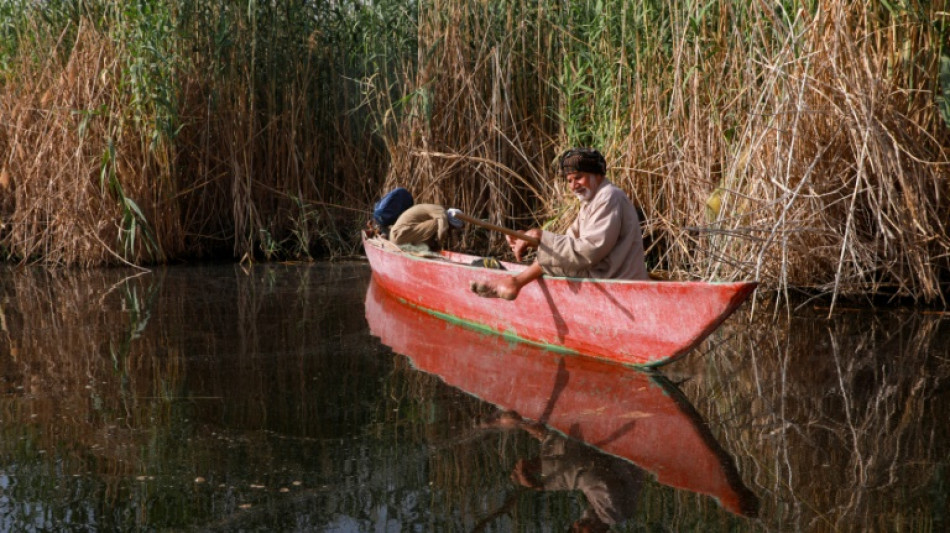
-
 Smith laments lack of runs after first Ashes home Test loss for 15 years
Smith laments lack of runs after first Ashes home Test loss for 15 years
-
Russian barrage on Kyiv kills one, leaves hundreds of thousands without power

-
 Stokes, Smith agree two-day Tests not a good look after MCG carnage
Stokes, Smith agree two-day Tests not a good look after MCG carnage
-
Stokes hails under-fire England's courage in 'really special' Test win

-
 What they said as England win 4th Ashes Test - reaction
What they said as England win 4th Ashes Test - reaction
-
Hong Kongers bid farewell to 'king of umbrellas'

-
 England snap 15-year losing streak to win chaotic 4th Ashes Test
England snap 15-year losing streak to win chaotic 4th Ashes Test
-
Thailand and Cambodia agree to 'immediate' ceasefire

-
 Closing 10-0 run lifts Bulls over 76ers while Pistons fall
Closing 10-0 run lifts Bulls over 76ers while Pistons fall
-
England 77-2 at tea, need 98 more to win chaotic 4th Ashes Test

-
 Somalia, African nations denounce Israeli recognition of Somaliland
Somalia, African nations denounce Israeli recognition of Somaliland
-
England need 175 to win chaotic 4th Ashes Test

-
 Cricket Australia boss says short Tests 'bad for business' after MCG carnage
Cricket Australia boss says short Tests 'bad for business' after MCG carnage
-
Russia lashes out at Zelensky ahead of new Trump talks on Ukraine plan

-
 Six Australia wickets fall as England fight back in 4th Ashes Test
Six Australia wickets fall as England fight back in 4th Ashes Test
-
Man Utd made to 'suffer' for Newcastle win, says Amorim

-
 Morocco made to wait for Cup of Nations knockout place after Egypt advance
Morocco made to wait for Cup of Nations knockout place after Egypt advance
-
Key NFL week has playoff spots, byes and seeds at stake

-
 Morocco forced to wait for AFCON knockout place after Mali draw
Morocco forced to wait for AFCON knockout place after Mali draw
-
Dorgu delivers winner for depleted Man Utd against Newcastle

-
 US stocks edge lower from records as precious metals surge
US stocks edge lower from records as precious metals surge
-
Somalia denounces Israeli recognition of Somaliland

-
 The Cure guitarist and keyboard player Perry Bamonte dies aged 65
The Cure guitarist and keyboard player Perry Bamonte dies aged 65
-
Draper to miss Australian Open

-
 Police arrest suspect after man stabs 3 women in Paris metro
Police arrest suspect after man stabs 3 women in Paris metro
-
Former Montpellier coach Gasset dies at 72

-
 Trump's Christmas gospel: bombs, blessings and blame
Trump's Christmas gospel: bombs, blessings and blame
-
Russia lashes out at Zelensky ahead of new Trump meeting on Ukraine plan

-
 Salah helps Egypt beat South Africa and book last-16 place
Salah helps Egypt beat South Africa and book last-16 place
-
Australia's Ikitau facing lengthy lay-off after shoulder injury

-
 Another 1,100 refugees cross into Mauritania from Mali: UN
Another 1,100 refugees cross into Mauritania from Mali: UN
-
Guardiola proud of Man City players' response to weighty issues

-
 Deadly blast hits mosque in Alawite area of Syria's Homs
Deadly blast hits mosque in Alawite area of Syria's Homs
-
The Jukebox Man on song as Redknapp records 'dream' King George win

-
 Liverpool boss Slot says Ekitike reaping rewards for greater physicality
Liverpool boss Slot says Ekitike reaping rewards for greater physicality
-
Judge jails ex-Malaysian PM Najib for 15 more years after new graft conviction

-
 Musona rescues Zimbabwe in AFCON draw with Angola
Musona rescues Zimbabwe in AFCON draw with Angola
-
Zelensky to meet Trump in Florida on Sunday

-
 'Personality' the key for Celtic boss Nancy when it comes to new signings
'Personality' the key for Celtic boss Nancy when it comes to new signings
-
Arteta eager to avoid repeat of Rice red card against Brighton

-
 Nigeria signals more strikes likely in 'joint' US operations
Nigeria signals more strikes likely in 'joint' US operations
-
Malaysia's former PM Najib convicted in 1MDB graft trial

-
 Elusive wild cat feared extinct rediscovered in Thailand
Elusive wild cat feared extinct rediscovered in Thailand
-
Japan govt approves record budget, including for defence

-
 Seoul to ease access to North Korean newspaper
Seoul to ease access to North Korean newspaper
-
History-maker Tongue wants more of the same from England attack

-
 Australia lead England by 46 after 20 wickets fall on crazy day at MCG
Australia lead England by 46 after 20 wickets fall on crazy day at MCG
-
Asia markets edge up as precious metals surge

-
 Twenty wickets fall on day one as Australia gain edge in 4th Ashes Test
Twenty wickets fall on day one as Australia gain edge in 4th Ashes Test
-
'No winner': Kosovo snap poll unlikely to end damaging deadlock


'Leave our marshes alone': Iraqis fear oil drilling would destroy fabled wetlands
Plans to drill for oil in the protected Mesopotamian Marshes of southern Iraq have galvanised villagers and activists determined to save the mythical wetlands already battered by years of drought.
"We will never accept it," marshes activist Murtada al-Janubi told a meeting, seeking to reassure anxious residents gathered in a traditional hall made of woven reeds from the wetlands, to discuss the government's plans for the UNESCO-listed area that is their home.
Everyone nodded in approval.
If they fail to save the Huwaizah Marshes, "a historical era... with its heritage and southern identity will vanish for ever", Janubi, 33, told AFP during a tour of the wetlands that straddle the Iraq-Iran border.
The millennia-old history of the marshes -- the reputed home of the biblical Garden of Eden -- "would end with this oilfield", said the moustached, tanned activist.
In 2023, as China became a major player across various sectors in Iraq, the oil-rich country awarded a Chinese firm the rights to explore the Huwaizah field.
Several residents of Abu Khsaf, the village in Missan province where the meeting with activist Janubi was held, said that at the time they did not fully grasp the implications.
Only this year, when heavy machinery was brought in to conduct seismic studies and open a new road, did the residents say they recognised a "threat" to the swamplands that have sustained their traditional way of life.
The government says that the oil and environment ministries are collaborating closely to avoid endangering the wetlands, and that any activity would occur near, not inside, the marshes.
Satellite images of the area from March, which AFP obtained from Planet Labs, show tracks left by heavy vehicles.
Wim Zwijnenburg of Dutch peace organisation PAX said the images point to the "rapid" construction of "a 1.3-kilometre-long dirt road in the vegetation of the marshes".
- 'All we want is water' -
Missan province already has several oilfields, including one just kilometres (miles) from the marshes.
Its emissions fill the sky with heavy grey smoke, and its gas flares can be seen from the fishing boats that roam the depleted marshes, suffering after years of harsh drought and dwindling water supplies.
Nestled between the Tigris and Euphrates rivers, the Mesopotamian Marshes depend on rivers and tributaries originating in neighbouring Turkey and Iran.
Sparse rainfall and reduced water flows blamed on climate change, upstream dams and government rationing have created shortages with severe impacts on the marsh ecosystem.
Residents expect the marshes to dry up in summer, hoping for a long-absent good rainy season to revive them.
The current water level in many areas is less than a metre (three feet) deep. Um al-Naaj lake, once teeming with fish, is now just three metres deep, compared with at least six before the drought.
Rowing his boat on the lake, fisherman Kazem Ali, 80, said that while the new project may create some jobs, "we, the average people, will not benefit".
"All we want is water," he said.
Rasul al-Ghurabi, a 28-year-old buffalo farmer, said he would never quit "the marshes and the freedom that comes with them" even if the oil company offered him a job.
- Protected core -
One cool March morning, as he led his buffaloes to the marshes to graze, Ghurabi was surprised to see workers laying cables and drilling holes.
A cable caused one of his animals to stumble, he said.
The marshes contain a core area that serves as a habitat for numerous species, including migratory waterbirds, surrounded by a buffer zone for protection.
Activists have accused authorities of conducting seismic studies within the core, which the state-owned Missan Oil Company denies, saying that the vehicles spotted in the area were carrying out work for a separate field nearby and had since left.
The Huwaizah oilfield was discovered in the 1970s, and Iraq shares it with Iran, which has been extracting oil for a long time.
The Missan Oil Company says that 300 square kilometres (116 square miles) of the field's area overlap with the marshes' buffer zone, but that the oilfield does not encroach on the core.
An environmental impact assessment concluded in 2024 would provide "the baseline for work in the field", the company said, adding that exploration would take place "without harming the natural habitat".
According to environment ministry official Jassem Falahi, the protected status of the marshes does not bar development projects.
"But investment is subject to specific conditions and standards that must not disturb the core area... or affect the site and its biodiversity," he told AFP.
- Balance -
Iraqi activist Ahmed Saleh Neema, a vocal advocate for the protection of the marshes, expressed concerns that oil companies might not adhere to regulations and further drain the marshes.
A UNESCO spokesperson told AFP that "concerns have been raised in recent years" over the potential impact of oil-related activities on the marshes.
Across the border in Iran, local media have long warned against the environmental impact of oil projects.
In a report earlier this year, two decades into oil activities in the wetlands known in Iran as Hoor al-Azim, the Tasnim news agency said energy companies had obstructed water flows and drained areas to build infrastructure.
Tasnim also said that oilfields have polluted water resources.
Environmental activist Neema said authorities should strike "a balance between two great resources: the oil and the marshes".
Iraq is one of the world's largest oil producers, and crude sales account for 90 percent of state revenues.
But while oil is financially vital, the marshes represent the livelihood of its people and "the heritage, the folklore, and the reputation of Iraq", Neema said.
Back in the village of Abu Khsaf, Janubi said: "Our region is already teeming with oilfields. Isn't that enough?"
"Leave our marshes alone."
J.Williams--AMWN

